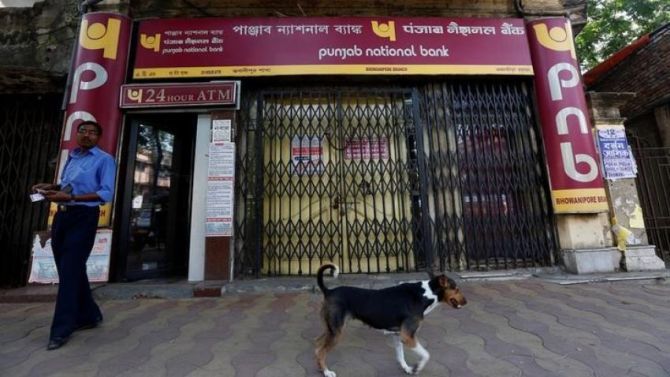'Modi wants to reverse everything Nehru did, but is shy of touching his daughter's most unwise policies.'
'There is no example of this more stark than bank nationalisation,' says Shekhar Gupta.

Photograph: Rupak De Chowdhuri/Reuters
At the risk of making many of you yawn, or go 'not again', let me use that much-spoken wisdom: Never waste a crisis. The reason this great wisdom is rarely put into effect is that it needs boldness.
It isn't an option for bureaucrats, time-servers, or the risk-averse. The reason we invoke this again now is simply that Prime Minister Narendra D Modi is none of the above. He is the biggest risk-taker in our politics after Indira Gandhi.
Funny that the audacity we seek from him is to undo the most audacious, and disastrous actions of none else than hers.
In her socialist push, as she split the Congress in 1969, she dramatically announced the nationalisation of big commercial banks.
Until the 1991 reform, more banks were nationalised. With all insurance also nationalised and development finance institutions (DFIs) State-owned, she made the government's control of India's formal finance total.
She was rewarded in election after election for her fake, wealth-destructive socialism, as she convinced the poor she was hurting the rich, but would do something for them, going ahead.
No such thing happened, but the poor continued to be fooled, and she kept winning elections, even as the socialist riches looked more and more mythical until the oil shock of 1973 (after the Yom Kippur war) and other changes pushed India's inflation rates into the late 20s, fully exposing her sham economics.
For 40 years since then, India has been trying to regenerate the scorched earth she left in her manic socialist phase. She herself realised its folly but too late.
Political history tells us how easy, risk-free, and lucrative State populism is, and how challenging, risky, and usually unpopular it is to reverse it.
The bravest of reformers take such 'pangas' (walking into minefields would be an approximate translation).
Narasimha Rao and Manmohan Singh did some of this in 1991, and later Atal Bihari Vajpayee with Yashwant Sinha and Jaswant Singh.
There were expectations of something more dramatic from Prime Minister Modi. He inherited the banks that Indira took over in a near-bankrupt state.
Four years on, he will be pumping fresh capital into them, throwing more good taxpayer money after bad loans to India's richest, the most spoilt and corrupt.
India's 21 public sector banks are still central to the country's finance: They account for 55 to 60 per cent of the all-India market. Most are listed on the stock markets.
But note, and hold your breath, all put together -- including the venerable State Bank of India -- have a market cap less (by a good Rs 500 billion to date) than that of HDFC Bank, which came into being just over 23 years ago.
Public sector banks, in comparison, have legacies going back decades, in many cases more than a century.
That's the kind of wealth destruction State-owned banking has carried out.
Ask any shareholder in any company. If your management was so callous with your money, wouldn't you simply vote with your feet? You would, except when you are the government.
Then you will throw in even more money to perpetuate the disaster. Why? Because you know it isn't your money.
The money belongs to silly, gullible, unthinking idiots, so I will burn more of it to create the myth that it will work to their benefit in the course of time.
As with Mrs Gandhi in her heyday, no such thing will happen.
The only beneficiaries would be people like these jeweller Modis, and Mallyas in the past and present, now selling back their unpayable debts at deep discounts that make lenders' 'haircuts' an understatement.
Several of the lenders will end up with a Tirupati-style mundan (tonsuring), probably with just a tuft hanging.
So uneven and unfair is this that some of the same defaulters are now bidding to buy back companies they themselves bankrupted, but at a heavy discount.
Check out that Davos group photo with Prime Minister Modi, and you will find some of these there as well. Check out the Yiddish dictionary for 'chutzpah'.
India's banking goes through a bad debt crisis periodically. Check the dishonour roll of India's defaulters on any of these occasions and you will find some usual suspects featuring repeatedly.
The only reason this happens is they are again able to go back to the same sarkari banks, with similarly inflated project proposals, and fail to pay, knowing that historically, we've been an incredible economy where debt is utterly forgiving.
The other factor which is common to all these lists is that all, I repeat all (barring the odd exception), banks robbed by them are nationalised banks.
Even from Vijay Mallya, private banks have recovered almost all their money.
Whatever Mrs Gandhi may have intended, her bank nationalisation didn't work for the poor, but has been brilliant for many thriving corporate legacies.
Just look at it this way. If, at half of any ratios you choose, like the size of your loan-book, if government banks had a market cap even half of private banks, the Indian government -- and the taxpayer -- would be richer by some Rs 10 trillion, if not more.
To say that nationalised banks suffer because they lend to the poor or the priority sectors is to do the poor a great disservice because they mostly pay back and the middle class always does.
And even when the poor, especially farmers, can't pay, the government pays the banks: Once again to buy votes on election-eve.
On November 13, 2008, Fareed Zakaria delivered the annual Jawaharlal Nehru Memorial Lecture in New Delhi. While he complimented India's banking system for having escaped the meltdown richer economies had, Sonia Gandhi, speaking as the host, was effusive in her acknowledgement of Indira Gandhi's prescience, as if the only reason Indian banks had survived was that these were State-owned and not because of prudent regulation.
She repeated this subsequently, at the Hindustan Times Leadership Summit later in the year, also poking the mostly suited audience to say 'I know you people will not like what I am going to say'.
The Gandhi family lays such store by the senior Mrs Gandhi's greatest economic folly that it would be impossible for any Congress government to be even vaguely seen to be diluting State-ownership of banks.
Why Narendra D Modi is bound by the same sentiment beats us.
The most surprising thing about Narendra D Modi is that he wants to reverse everything Nehru did, repudiate him altogether, but is shy of touching his daughter's most unwise policies.
There is no example of this more stark than bank nationalisation.
In 1969, she took over asserting that these banks were lending only to the rich and ignoring the poor.
In nationalisation's 50th year, the same banks are broke because they gave too much money to the rich without asking questions, and got robbed.
If you want to be lazy, call it irony.
What would you call the political folly of continuing with this policy but also throwing about Rs 2.11 trillion of taxpayers' money behind it?
Punjab National Bank is no faltu, tiny, cooperative bank owned by a politician in the Maharashtra sugar belt. It is India's second largest government bank.
The latest scam shows it's been vacuumed by some of the world's richest thieves over many years, undetected by multiple audits and the board with government (especially finance ministry) nominees.
This level of leakage, lack of diligence and accounting/audit failure is just one mega national shame and embarrassment.
That's why Narendra D Modi should dump it, sell it, forget it. It will be a very popular thing today.
It will also give him the satisfaction of blaming for this -- rightly in this case -- the second-most important member of the dynasty he so detests.
This crisis is his to waste.
By special arrangement with ThePrint











 © 2025
© 2025